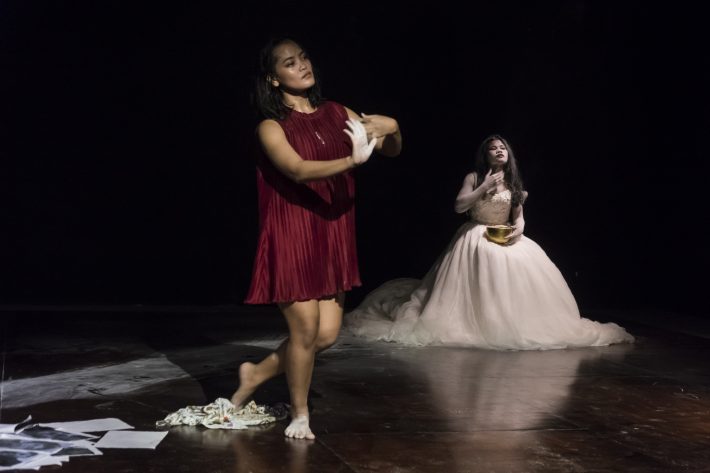Lit solely by shadow, fragile forms strain under an otherworldly weight. Emerging from the inky dark, their trembling forms resolve into marionettes jerked upright by the whims of the unseen.
For an unaware viewer, the title Snow Whitening Revisited may very well be just another tagline plastered across the latest of women’s beauty products. Not quite. For what emerges from the opening minutes of the performance evidently indicates this is anything but a quippy marketing campaign.
Initial grace tumbles into pain. An ankle first, and… what’s this? Calves are waylaid, a leg sprawls out in excruciating exhaustion behind her. And as every graceful spin resolves into undeniably painful contortions — so much so that one can’t help but feel for the performer — her dance is left uncompleted, unfulfilled. In their performance, the New Cambodian Artists’ masterful performance speaks to something more: the collective pain of an entire demographic.

Employing choreography and light to ruminate on the experience of emotion in Cambodia, every aspect of the performance is tightly shepherded to deliver a scathing critique of social spaces for personal feeling. With death-dance culminating in a cathartic embrace, even the space of the stage seems to collapse in on the pair of dancers, confining them solely in a compact circle of light, allegorising their utter imprisonment within allotted spaces allowed by society. As the light falls across their hair, every space seems too exposed, too oppressive for the display of emotion conveyed in the heartfelt embrace between the two.
Nowhere is safe for the two dancers. As they cling to what light and hope remain in their lives, the rapidity of interchanging poses smoulders into inevitable death for one. Even then, bleak reality realises the other to be reduced to guttural, animalistic speech — yet another scathing critique of a society so oppressive in custom that voices of friends and family render her mute amidst her desperate cries to reassert her own inner voice and individuality.
But beyond even these stylistic choices, the performance delves into the abject horrors of the Khmer Rouge regime. As a way of reversing and reimagining this pain, the NCA deliver a deeply introspective moment of a ritual honouring female artists killed in the infamous Security Prison 21. Juxtaposing a scene of explicit repression against that of the very real implicit repression in the modern-day, a dancer lights incense sticks and flips through greyscale images of the deceased. With each eerie and haunting snapshot falling away, they engage the audience in considering the very real atrocity and unspeakable dread of the Cambodian Genocide. On the other end, the second dancer slowly trails in, a wedding gown in hand.
As the first dancer helps her friend into the gown, she tugs her corset, pulling her upright and offering her support. Comradeship and rapport are established as the women hold on to each other as they face their impending fate of marriage. Next, the dancers cover each other in ashes, a highly symbolic motif of the performance.
As shared by director Bob Ruijzendaal in our previous interview, the union of dancers and the white ashes is atypical. Many other Cambodian performances featured dancers washing away the “whiteness” that is associated with female innocence, availability and death. In Snow Whitening Revisited, this union signifies liberation, a step out of the constricting stereotypes and expectations imposed on female artists.

Characteristic of dance performances, no words were needed for dancers Ny Lai and Khun Sreynuch to express their narrative through movements alone. Every step of the dance was executed with immense intention that signalled to me exactly what the choreographers aimed to communicate — the angst, struggle and conflict faced in the attempt to negotiate their place in society. The storyline was relatively easy to follow.
As an art piece which serves to challenge the status quo and spark conversation about the struggles of female artists in Cambodia, Snow Whitening Revisited’s coherent storytelling was especially effective in delivering a darkly unresolved fate for the very real individuals who continue to live under oppression. The sounds of dogs barking is a final, poignant reminder of a past not yet gone.
All photo credits: Anders Jiras

